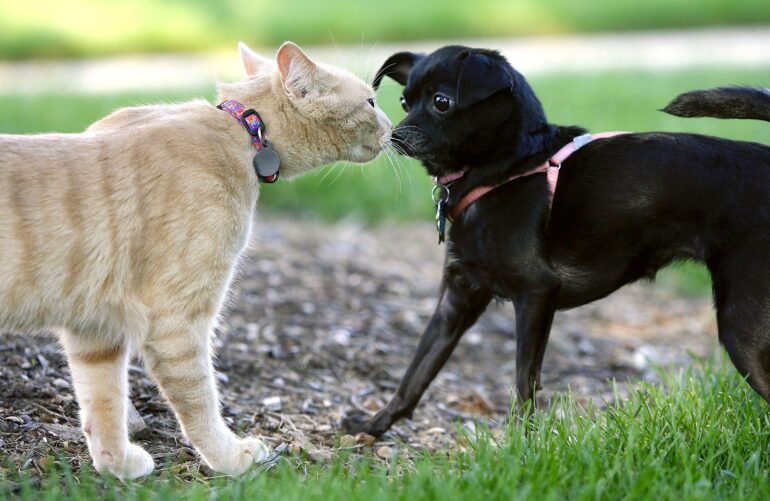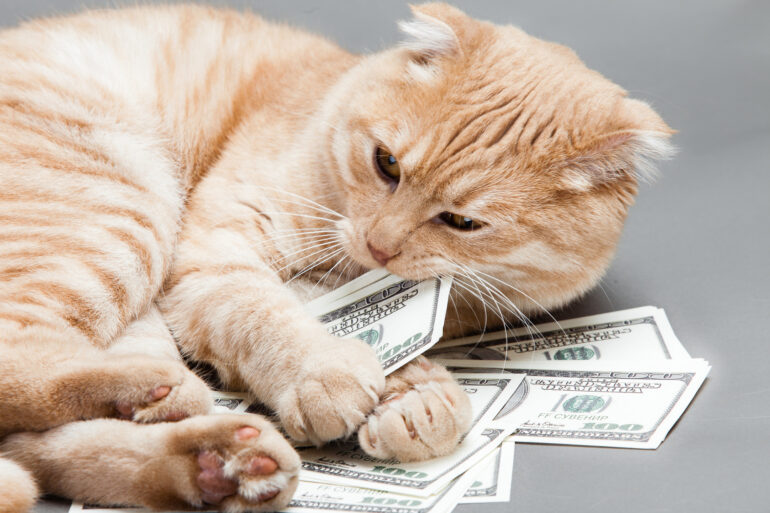If you have a pet, you most likely have a dog or a cat – or both. Some people show a clear preference for one or the other, and some evidence suggests that pet preferences influence people’s behaviors, including income status and the propensity for making certain financial decisions.
Let’s take a brief look at some of the differences between feline and canine owners. Who knows, perhaps it will turn out that your pet is in charge of your life!
What does your pet preference say about you?

You might have heard that humans tend to bond with pets that show traits that they find valuable or even similar to their own. If, for example, you are a person full of energy or with a lot of free time, you might prefer a playful dog over a sleepy cat. These preferences are likely to be related to other things about you, such as how much free time you have or how old you are.
There are reasons to believe these assumptions are correct. For instance, data from Nuwber shows that certain demographic groups are more likely to have a preference for one type of pet over the other.
For example, cat owners are more likely to be medical professionals and also more likely to be older. Dog owners, on the other hand, are more likely to work in a professional/technical field and have higher incomes.
It’s worth noticing that the demographic differences between dog people and cat people are not always particularly high.
For example, the difference in the percentage of technical professionals who have a dog and technical professionals who have a cat is only 1.31%. On the other hand, the difference between retired individuals who have a dog or a cat is more significant, with 7.61% more retired individuals having cats under their custody.
So, in other words, if you are a busy medical doctor or someone who does not have the energy to engage with a playful dog constantly, you are more likely to prefer cats as pets. If, on the other hand, you have the financial resources and the available time to have a dog, there’s a higher likelihood you will actually have one.
Can pets change your financial behaviors?

Having a dog or a cat may not only be influenced by circumstantial factors. According to Harvard Business Review, cat people are more prudential consumers compared to dog people. The claim comes after a group of researchers from the University of South Carolina conducted an experiment that ended with some interesting conclusions.
In the experiment in question, pet guardians were provided with fundamental explanations of stocks and mutual funds, underlining the higher risk involved with the former.
They then inquired about which financial instrument the participants would prefer to purchase and the amount they’d be willing to invest. It was observed that dog owners had a higher tendency to choose stocks, and they committed more funds to them compared to the small number of cat owners who selected stocks.
The review article also points out that other studies indicated a preference among cat owners for products that mitigated issues, whereas dog owners were attracted to products that offered potential profits. In other words, cat owners tend to be more conservative consumers compared to dog owners.
Professor Xiaojing Yang, one of the researchers who conducted this study, has some ideas on the nature of these differences. According to him, consumers can be classified into two mental frameworks: 1) a promotion focus and 2) a prevention focus.
The former is marked by a willingness to take risks and a drive to maximize benefits, while the latter is characterized by a cautious approach, aversion to risks, and a goal to minimize losses.
Dogs, stereotyped as being open and adaptable, are supposedly associated with a promotion focus. Cats, on the other hand, being more reserved, are presumably associated with a prevention focus.

Professor Yang and his colleagues theorize that interactions with either dogs or cats trigger these traits in individuals, pushing them towards products that represent risk and potential gains or safety and risk prevention.
You might have heard that correlation does not imply causation, and this is a point that needs to be taken into consideration when digesting this study. In other words, while risk-takers are more likely to have dogs and cautious consumers are more likely to have cats, we don’t know what causes what.
It may be that interactions with these animals influence our behavior, that our behaviors make us choose one pet over the other, or that other unknown factors influence both consumer behavior and the likelihood of having a dog or a cat.
Research from Mars Petcare, a private company, also reported some interesting data on the differences between dog people and cat people. The study in question involved 2,000 pet owners – 1,000 cat owners and 1,000 dog owners.
It was found that dog owners tend to be drawn toward active hobbies such as sports, travel, dancing, and yoga. On the other hand, cat owners were found to favor calmer activities like reading, writing, or gardening.
Like the study from the University of South Carolina, this research suggests that our pets’ personality reflects to some extent our own personality. An alternative interpretation is that our pets’ behaviors influence our behaviors. Whatever the truth is, one thing is clear – differences between dog people and cat people do exist.
Dog people are young, well-off, and risk-takers. Cat people are busy, older, and cautious. Or are they?

As surprising as it might sound to some, a person’s preference for dogs or cats is at least a weak indicator of demographics and consumer behavior. If you are young, have a good financial situation, and are more willing to take risks, there’s a somewhat higher chance that you have a dog under your custody.
If, on the contrary, you are older, don’t have a lot of free time, and don’t like to take risks, there’s a somewhat higher likelihood there’s a cat that calls your house home.
These differences, while they exist, are often small, and their nature is debatable. As such, if you are considering getting a dog or a cat, it’s probably best not to decide based on anything else but your needs and possibilities. Once you have a pet, you will most likely want to avoid making financial decisions that reflect the personality of your fluffy companion.
